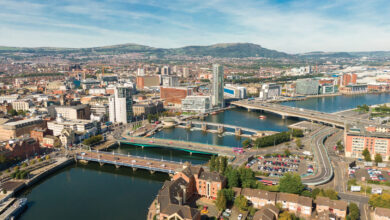Shared services in health
 Shared services would improve efficiency in the health sector according to the Business Services Organisation which is implementing an ICT transformation project. agendaNi reports.
Shared services would improve efficiency in the health sector according to the Business Services Organisation which is implementing an ICT transformation project. agendaNi reports.
The five health and social care trusts and related health organisations are in the process of developing a single organisation to carry out and update common services such as human resources, finance and payment of GPs and dentists.
Overseen by the Business Services Organisation (which provides regional business support and professional services to the health and social care sector in Northern Ireland), the Business Services Transformation Project (BSTP) is to be implemented by 2013. The BSO Programme Board expects that the new systems will create a more efficient health service, reduce operational costs and absenteeism and improve governance and accountability.
When the project is completed, staff will have access to their personal records and their payroll details via a web-based application. Staff will be able to change their own address and contact details. In addition, suppliers will be able to register and tender on-line for goods and services, submit on-line invoices and monitor payments.
The transformation project will also apply to the BSO, the Northern Ireland Ambulance Service, the Health and Social Care Board and the Public Health Agency. The overall shared services project is divided in three: the HR, payroll, travel and subsistence (HRPTS) project; the finance, procurement and logistics (FPL) project and the family practitioner services project.
The preferred bidders for the new business IT systems are due to be announced in September 2011.
The BSO programme board concluded the final round of dialogues with bidders for the HRPTS and FPL projects in April. Meanwhile, regional project boards are arranging meetings to discuss how the changes will affect them and to begin preparing their offices for the changes. ‘Work packages’ currently under way include an inventory of existing ICT system contracts, preparatory work to meet with ICT technicians to identify any hardware and ICT infrastructure issues and planning for an audit of basic ICT skills.
Approximately 1,000 members of staff took part in road show events prior to a public consultation in 2008. More road shows are planned to raise awareness.
Originally, the BSO planned to build two purpose-built shared services centres at a cost of £20 million, however, funding for this is no longer available. A spokesman for the Department of Health, Social Services and Public Safety clarified that “decisions on the model, timing and location of sites, have not yet been determined, these will be matters for consideration by the new Minister in due course.”
In November 2010, the BSO’s Chief Executive David Bingham told an agendaNi conference that the procurement process would drive the rest of the process and that the BSO “can’t introduce shared services until we have our new systems implemented.”
According to the BSO’s HR Director, Hugh McPoland, shared services “whilst creating the need for real cultural and organisational change for all of us, [have] the potential to offer its HSC partners substantial financial and qualitative benefits.”
The new systems would “not only provide us with an opportunity to update technologically but also to improve efficiency, change the culture, and move HR and payroll functions forward,” observes Jacinta Melaugh, who chairs of the HRPTS project.





